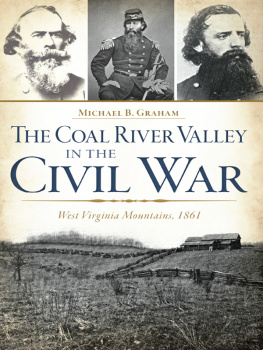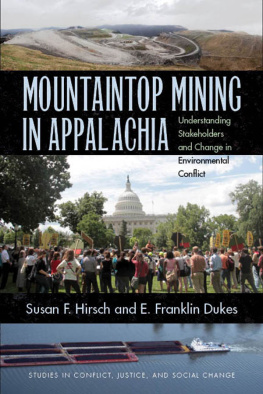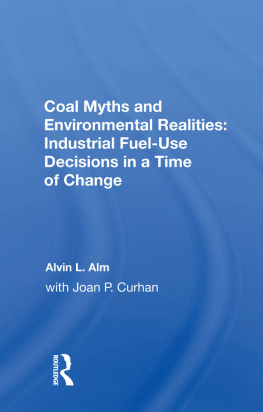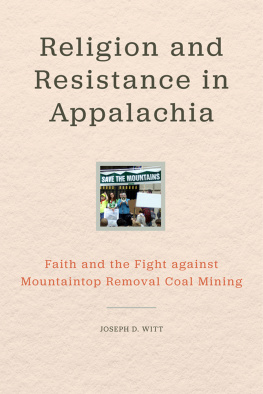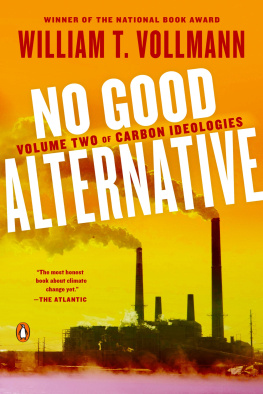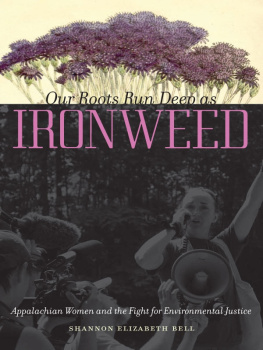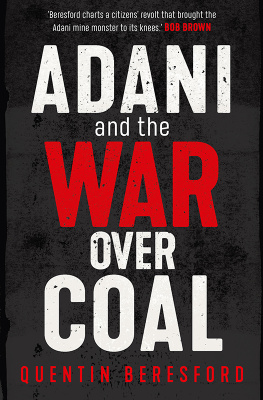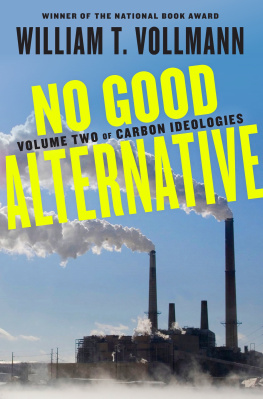Standing Our Ground
Ohio University Press
Series in Race, Ethnicity, and Gender in Appalachia
Series Editor:
Marie Tedesco
Memphis Tennessee Garrison:
The Remarkable Story of a Black Appalachian Woman,
edited by Ancella R. Bickley and Lynda Ann Ewen
The Tangled Roots of Feminism, Environmentalism,
and Appalachian Literature,
by Elizabeth S. D. Engelhardt
Red, White, Black, and Blue:
A Dual Memoir of Race and Class in Appalachia,
by William R. Drennen Jr. and Kojo (William T.) Jones Jr.,
edited by Dolores M. Johnson
Beyond Hill and Hollow:
Original Readings in Appalachian Womens Studies,
edited by Elizabeth S. D. Engelhardt
Loving Mountains, Loving Men,
by Jeff Mann
Power in the Blood: A Family Narrative,
by Linda Tate
Out of the Mountains: Appalachian Stories,
by Meredith Sue Willis
Negotiating a Perilous Empowerment:
Appalachian Womens Literacies,
by Erica Abrams Locklear
Standing Our Ground: Women, Environmental Justice,
and the Fight to End Mountaintop Removal,
by Joyce M. Barry
Standing
Our
Ground
Women, Environmental Justice, and the Fight to End Mountaintop Removal
Joyce M. Barry
OHIO UNIVERSITY PRESS ATHENS
Ohio University Press, Athens, Ohio 45701
ohioswallow.com
2012 by Ohio University Press
All rights reserved
To obtain permission to quote, reprint, or otherwise reproduce or distribute material from Ohio University Press publications, please contact our rights and permissions department at (740) 593-1154 or (740) 593-4536 (fax).
Printed in the United States of America
Ohio University Press books are printed on acid-free paper
21 20 19 18 17 16 15 14 13 12 5 4 3 2 1
Library of Congress Cataloging-in-Publication Data
Barry, Joyce M.
Standing our ground : women, environmental justice, and the fight to
end mountaintop removal / Joyce M. Barry.
p. cm. (Ohio University Press series in race, ethnicity, and gender in Appalachia)
Includes bibliographical references and index.
ISBN 978-0-8214-1997-7 (hc : alk. paper)
ISBN 978-0-8214-4410-8 (electronic)
1. Environmental justiceAppalachian Region. 2. WomenPolitical
activityAppalachian Region. 3. Mountaintop removal mining
Social aspectsAppalachian Region. 4. Landscape protection
Appalachian RegionCitizen participation. 5. Coal mines and
miningEnvironmental aspectsAppalachian Region. 6. Community
activistsAppalachian Region. I. Title.
GE235.A13B37 2012
622.334dc23
2012027267
For Julia Judy Bonds
You have stolen our land, and used despicable stereotypes of mountain people to justify yourselves to national media. You consigned hundreds of thousands of men and boys to horrible working conditions with great loss of life and limb. You took away freedom and dignity and trampled on civil liberties. You brought violence to bear against people who stood up for their rights. You evicted the widow and orphans from their homes. You polluted our rivers first, then our groundwater. You polluted and corrupted and cheapened the political process in this state, and made a mockery of government by the people. You abandoned our communities without sewage and water systems and left our school systems in poverty. You shifted your tax burden onto the people of this state. You condemned miners to the living death of black lung while denying them just compensation. You destroyed our roads with overloaded coal trucks and bragged publicly about breaking the law. You condemned those counties most dependent on coal to the greatest and most intractable poverty in this state. You filled our rivers with silt and increased the dangers of flooding. You tore families apart. You destroyed the habitat of our native animals. You deny workers the right to organize. You discourage the development of alternative energy sources. You lay off WV deep miners to employ out-of-state strip miners. 27 years ago today, you killed 125 men, women and children on Buffalo Creek and dared to blame it on God. You are flattening our mountains and filling in our hollows, and this is the last evil you will do.
Denise Giardina, Coalfield Justice Rally, February 1999
CONTENTS
ACKNOWLEDGMENTS
I wish to acknowledge many people for their interest and assistance in the production of this book. Thanks for the support of everyone at Ohio University Press, particularly Gillian Berchowitz. I also want to thank Lynda Ann Ewen, whom I met at the annual Appalachian Studies Conference in 2009, and who expressed interest in this topic. Of course, I am deeply appreciative of those working to end mountaintop removal coal mining (MTR) in Appalachia, and especially grateful to all of the activists who shared their time and experiences with me when requested. Over the years so many have inspired, angered, and motivated me with their life stories and passion to secure justice in the Appalachian coalfields. In particular I wish to thank Vivian Stockman, Ohio Valley Environmental Coalition Project Coordinator, my first contact in the coalfields, who graciously put me in touch with many women fighting Big Coal in West Virginia. Thanks also to Freda Williams, who first made me aware of what life in the coalfields is like in this era of MTR; and to Maria Gunnoe, Sarah Haltom, Lorelei Scarbro, Pauline Canterbury, Mary Miller, and Patty Sebok.
I am immeasurably grateful to Julia Judy Bonds, who died of cancer on January 3, 2011, and to whom this book is dedicated. Many people consider Judy to be the godmother of the anti-MTR movement, an indefatigable woman who made the fight against MTR the local, national, and international environmental justice issue it is today. Judy, who was very generous with her time and knowledge, impressed me with the great sense of urgency she consistently demonstrated while fighting Big Coal in Appalachia. I enjoyed our conversations over the years, and this book could not have been written without her assistance. To me, Judy was one of those people you meet in life who change you just by knowing them. While her loss is deeply felt by many working to end MTR, her lifes work will continue to inspire and challenge all of us.
I would like to thank my supportive colleagues at Hamilton College: Vivyan Adair, Vige Barrie, Donald Carter, Katheryn Doran, Peter Cannavo, Amy Gowans, Barbara Gold, Margaret Gentry, Jenny Irons, Chaise LaDousa, Heather Merrill, Onno Oerlemans, Bill Pfitch, Carl Rubino, Katherine Terrell, Julio Videras, Robin Vanderwall, and Steve Yao. I also want to thank my amazing students at Hamilton College, who consistently challenge me with their passion for learning and intellectual curiosity. Thanks also to everyone at the Hamilton College Library (particularly the interlibrary loan department) for your help with this research. I was fortunate to receive a National Endowment of the Humanities summer grant in 2006 entitled Regional Studies and the Liberal Arts: An Appalachian Exemplar, and I would like to thank the facilitators of this program at Ferrum College, Ferrum, Virginia, for their support of this project. In particular I wish to thank Peter Crow, Tina Hanlon, Susan Mead, George Loveland, Daniel Woods, and my fellow participant Gloria Goodwin Raheja. And I am deeply indebted to Phillip G. Terrie, who was there when I first became interested in environmental justice and the impact of MTR in Appalachia, as a PhD student in the American Culture Studies Department at Bowling Green State University in Bowling Green, Ohio.


